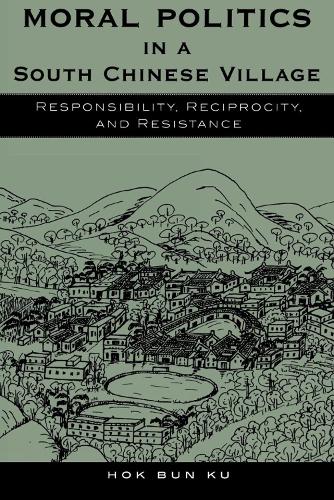
Moral Politics in a South Chinese Village: Responsibility, Reciprocity, and Resistance
(Paperback)
Publishing Details
Moral Politics in a South Chinese Village: Responsibility, Reciprocity, and Resistance
By (Author) Hok Bun Ku
Bloomsbury Publishing PLC
Rowman & Littlefield Publishers
25th August 2003
United States
Classifications
General
Non Fiction
Anthropology
Development studies
Social welfare, social policy and social services
305.8951
Physical Properties
Paperback
312
Width 152mm, Height 229mm, Spine 25mm
454g
Description
Exploring sensitive issues often hidden to outsiders, this engaging study traces the transformation of Ku Village during the first tumultuous decade of reform. Faced with an array of daunting government dictates, villagers have chosen active strategies for fighting back. Their weapons include resisting policies they consider unreasonable by evading fees, taxes, and family planning regulations; challenging the legitimacy of the local government; and reestablishing clan associations to supercede official authorities. Drawing on compelling personal stories, Ku argues that rural people are not in fact powerless and passive; instead they have a moral system that informs their everyday family lives, work, and political activities. Through his richly realized ethnography, Ku shows the reader a world of memorable, fully realized individuals striving to control their fate in an often arbitrary world.
Reviews
Ku effectively and wisely uses the theories of Gramsci, Bourdieu, and James Scott. Recommended. * Choice Reviews *
Writing in an engaging, readable style, Ku provides yet another interesting window into Chinese village life and farmer discontent during the post-Mao era. A worthwhile addition [that] will be of interest to anthropologists, sociologists, and political scientists alike. * The China Journal *
Framing everyday practice as moral politics, Hok Bun Ku makes a significant and unique contribution to the study of emergent citizen identity in contemporary rural China. -- Elisabeth Croll, University of London
Author Bio
Hok Bun Ku is assistant professor in the Department of Applied Social Sciences, The Hong Kong Polytechnic University. His father was a native of Ku Village who left to join the Chinese People's Liberation Army in 1948. Ku grew up in Hong Kong and first returned to his ancestral home in 1996.
